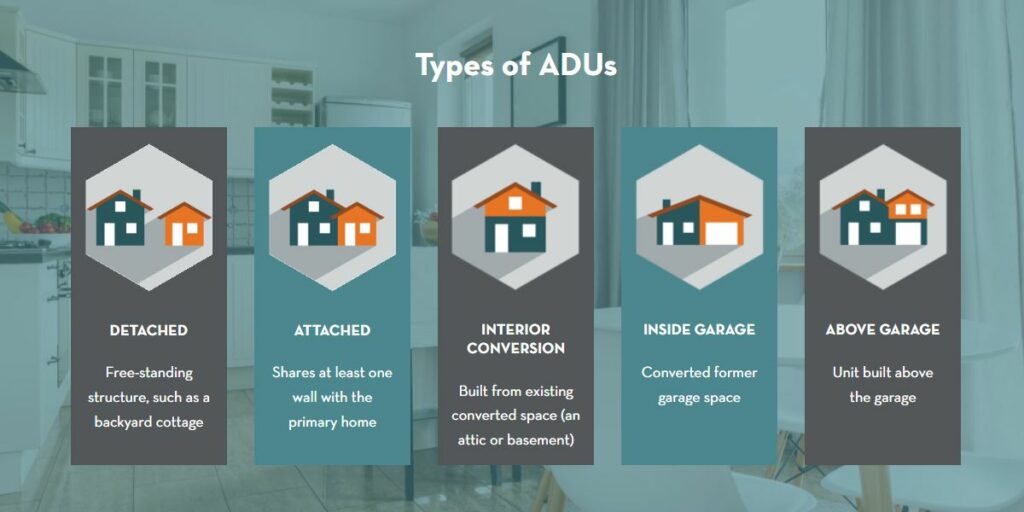Permitting
The process for building an ADU typically follows this workflow:
Financing → Zoning → Design → Permitting → Construction → Management
Placeholder
The costs to build an ADU can vary quite a bit. Depending on the type of ADU, the square footage and the finishes, among several other factors, ADU costs can range from $80,000 to $400,000. For the purposes of this site and assuming the entire project is contracted out to a builder, the estimated amounts below are for Construction Costs only. (Other costs to consider: design/blueprints, permitting, lot preparation and utilities, and landscaping.)
(INSERT GRAPHIC)
Process And Timeline
The City of Bend has put together a useful Accessory Dwelling Unit (ADU) Resource Hub that explains the permit process, timeline, costs and links to submit. The City has recently made the process more streamlined. Both planning and building can now be done with one submission.
You will need to create an account on the City of Bend’s Online Permit Center to submit your documents. You can find that here. At the top of the page you’ll find the link to register. Once registered, navigate to the “Building, Permanent Signs, and SDC Estimates” section and click on “Apply”.
To find a list of submittal items required, you can find them here: Residential Submittal Checklist.
Once you apply, the process typically takes 4-8 weeks, but can be very dependent on the quality and completeness of the permit documents submitted and the swiftness of your response to any plan review questions and comments.
Once your permit is approved, you will need to pay for your Permit Fees and System Development Charges (SDC). Then you will be issued your permit and you may proceed with construction!
What Are The Costs For Permitting?
You will need to pay Permit Fees to cover the costs of the review of your permit as well as inspections. You can request a Permit Fee estimate by emailing [email protected]. They will also include System Development Charges (SDC) information in your fee estimate.
You will also need to pay for System Development Charges which are used to fund City infrastructure and community support services. These are updated annually on July 1st. Building Permits and Fees are based on construction cost, size, and the number of fixtures and utilities you install. They include Streets, Parks, and Water and Sewer if you are modifying service.
Zoning
Placeholder
The costs to build an ADU can vary quite a bit. Depending on the type of ADU, the square footage and the finishes, among several other factors, ADU costs can range from $80,000 to $400,000. For the purposes of this site and assuming the entire project is contracted out to a builder, the estimated amounts below are for Construction Costs only. (Other costs to consider: design/blueprints, permitting, lot preparation and utilities, and landscaping.)
(INSERT GRAPHIC)
Common Definitions
The Bend Development Code has a comprehensive list but here are several to start:
ACCESSORY DWELLING UNIT (ADU)
An ADU is an ancillary or secondary living unit that has a separate kitchen, bathroom, and sleeping area existing within the same structure, or on the same lot, as the primary dwelling unit. The accessory dwelling unit may be a separate and detached unit, an attached unit to the principal structure, or a repurposed existing space.
FLOOR AREA RATIO (FAR)
FAR is a measurement of building density calculated by dividing the gross enclosed floor area of a building measured to the inside of the external walls by the land area of the development.
LOT COVERAGE
Lot coverage is all areas of a lot or parcel covered by buildings (as defined by building footprints) and other structures with surfaces greater than 18 inches above the finished grade, excluding unenclosed covered or uncovered porches, patios, decks, carports, balconies or stoops up to 10% of the total lot area. Eaves are not included in lot coverage.
SETBACK
Setback is the minimum allowable horizontal distance from a given point or line of reference, such as a property line, to the nearest vertical wall, building footprint or other element of a building or structure.
Can I Build An ADU On My Property?
If you don’t already have an ADU on your property and you live in a residential area then the Development Code would likely allow it. ADUs are a permitted use in all Residential Zoning Districts, and to a degree, in Mixed-Use Zoning Districts. Only one ADU is permitted on a lot or parcel and the primary residence must be a detached home, townhome, or manufactured home.
There is not a “one size fits all” approach to ADU projects, so it is highly recommended that you contact a professional to discuss details. Codes can be nuanced and open to interpretation. This is only meant to be a starting point and does not cover all of the finer details in Bend’s Development Code or Oregon’s Residential Specialty Code. Also note that if your neighborhood has Covenants, Conditions, and Restrictions (CC&Rs) those often trump the Development Code and may not allow for ADUs so be sure to check those first!
How Big Of An ADU Can I Build?
You can build an ADU of up to 800 square feet of enclosed living space. You must comply with the Floor Area Ratio (FAR) and Lot Coverage restrictions of your Zoning District. You can only build one ADU on your property.
Can I Construct An ADU On Top Of My Garage, Attach It To My Current Home, Or Convert A Room I No Longer Use?
ADUs come in all shapes and sizes and they don’t have to be detached. However, if they are detached then in most circumstances they must be a minimum of 6’-0” from the primary residence. When building up, out, or within you will need to comply with the Setbacks and Height Limits of your Zoning District which you can find in the Development Code. There are requirements regarding separating the ADU from the primary residence from fire, sound, and utilities.

Can I Park My Camper On My Lot, Or Build A Tiny Home On Wheels, And Call It An ADU?
ADUs must be built on a foundation and fully inspected by the City to be considered a legal dwelling unit.
Would I Have To Provide Parking For The ADU?
You do not have to provide parking for an ADU. But it would be a nice thing to provide, since on-street parking spaces are in short supply in most areas of the city.
The Bend Chamber is actively supported by these Signature Investors





